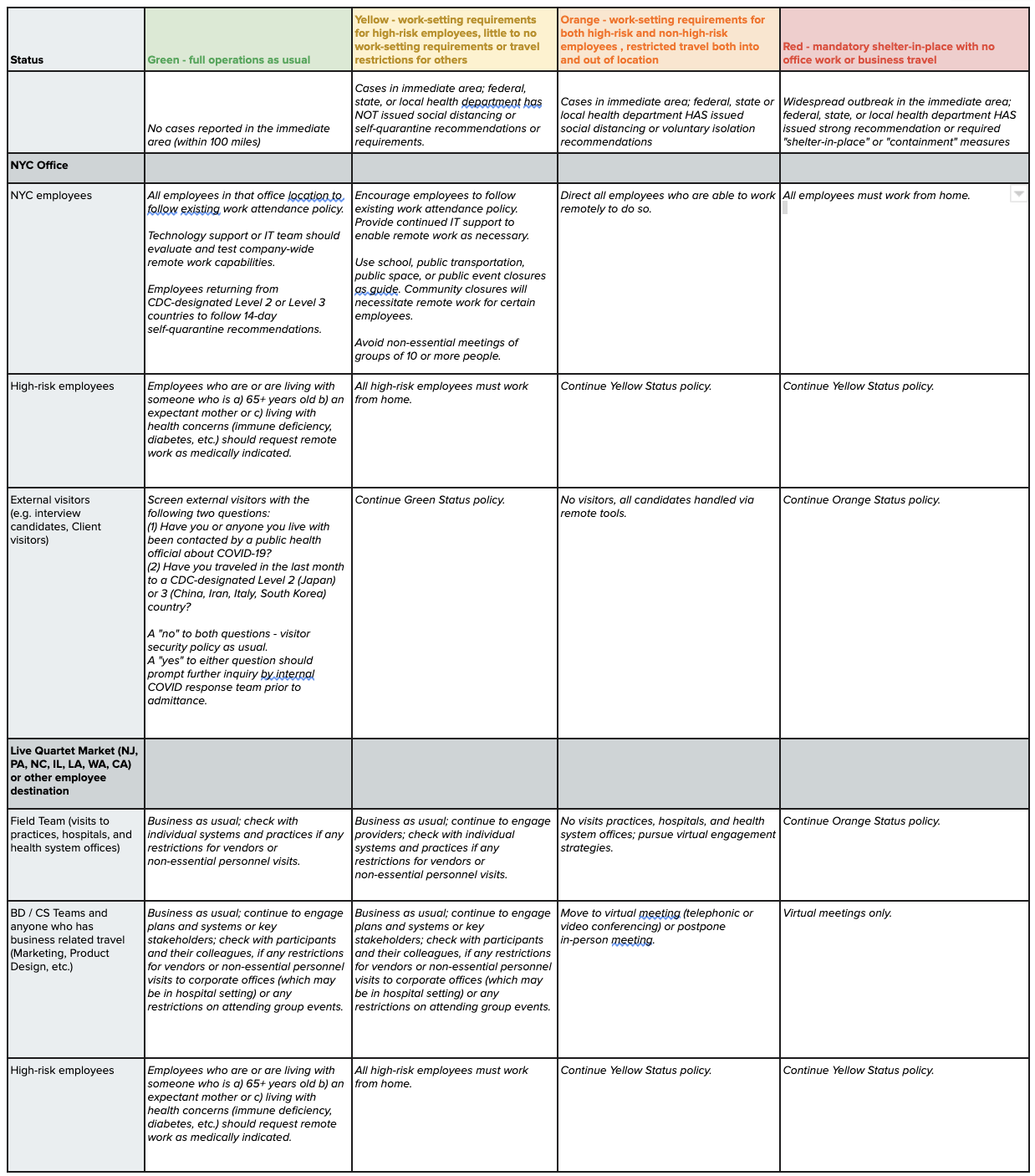Let us rise to the occasion: Our role as organizations during COVID‑19

David Wennberg, MD, MPH
CEO, Quartet Health
March 19, 2020
This is an extraordinary time to lead a team. I am humbled everyday by how adaptive and resilient people are. I am amazed (but not surprised) at how well we work as one community.
My philosophy as a leader is to surround myself with other strong leaders — and to trust them to make decisions in their areas of expertise. That is what we do on a daily basis at Quartet, and our response to COVID-19 preparedness has been no different. I am not an expert at all of the functions our company leads, but I am surrounded by an extraordinary team who is.
At Quartet, our Chief People Strategy Officer Ingrid Kessler had the early foresight to encourage us to set up a small COVID-19 Task Force. This advice, reflective of her 20 years managing people operations during times of mass crisis, has been invaluable. In this small Task Force, Ingrid and I have been joined by our Chief Medical Officer Dr. David Lim, an infectious disease physician by training, and Kevin Kumler, Chief Operating Officer, who brings decades of managing distributed health care organizations.
As individuals, there are a number of steps we should be taking personally. As an organization, there are other steps we can take to prepare for the moment we find ourselves in. We know the days and weeks ahead will be hard, and will continue to use these principles.
In case it can help other organizations at this time, below are some best practices we have put in place:
1. Keep it small.
“Who decides?”
During crises, it is difficult to make decisions when the group gets too big. We have found that our COVID-19 Task Force of 4 people — myself, Ingrid Kessler, Dr. Dave Lim and Kevin Kumler — is the ideal size. We frequently confer with other colleagues within our organization, getting informed perspectives and insights on how announcements would impact teams and operations. However, we bring that data back to the core COVID-19 Task Force and together make a decision. We use tools such as Slack, Google Hangouts, and Google docs that allow us to be collaborative in real time with edits, comments, and shared decision-making. We are comfortable as a group to bring in contrasting views and push back. Importantly, however: once we reach a decision we all move forward as one to implement.
2. Be transparent.
“What are employees thinking right now, and how do we quell their uncertainties?”
At Quartet, we aim to be transparent in our communications. This week, we launched our weekly Monday all-company COVID-19 meeting, which we conduct virtually via Zoom with 300 employees nationwide. We have opening remarks by senior leadership, and then entertain an open forum where we transparently answer questions that staff submit (either beforehand or live) related to COVID-19. We answer those publicly for all to hear. Importantly, with transparency comes honesty. We admit what we don’t know. The situation is rapidly changing, and we would rather be honest than be misguided.
3. Over communicate.
“Would this be valuable for the whole company to know?”
Early on we discussed different approaches. Do we wait to continue to see how COVID-19 unfolds worldwide before communicating too broadly? Or err on the side of caution, protecting employees with ample information but also not being alarmist? Together we decided to share all updates with the entire company, even if it only pertained to one group. This has allowed our organization to move forward with clarity and consistency, empowering staff members to understand their colleagues’ situations as well as their own.
4. Use frameworks to make decisions.
“What is our criteria to escalate?”
Structure liberates us. The same is true for frameworks. Quartet is a unique company, with operations all over the country. In the midst of information coming from countless sources at a rapid pace, we decided to align with the experts, and make informed decisions based on research and evidence from trusted sources worldwide. We also reached out to connections we have — whether in HR, infectious disease, or healthcare organizations — to stay on top of what others were doing. Inspired by Eden Health’s “Preparing Your Business for Novel Coronavirus” blog post, we put these best practices into a framework to understand how to make hard decisions and escalate more serious precautionary measures, when necessary. (You can see an example of our escalation framework below.) We created a shared document of trusted resources across our markets, and delegated responsibility for checking those resources daily to the market leader in each area. This practice empowered our local leaders to be equipped with the best sources of information, and manage updates in real-time locally.
5. Plan ahead.
“How can we help create clarity, where possible, for our staff?”
We have worked hard to help people plan as far ahead as possible. Our COVID team was up and running on Monday, March 2, 2020. We decided to closely follow local public health recommendations (we have teammates in 27 states). With our teams in Seattle, the initial ‘hot spot’ of COVID-19 we implemented work from home for that team on March 5, 2020. Then, as community spread became more widely happening, on Friday, March 13th we decided that we would become a fully-remote workforce and halt all travel for the foreseeable future. Instead of rolling out updates in one or two week increments, based on guidance we were seeing from trusted medical experts across the country, we decided to make the announcement for a complete month — until Friday, April 10, 2020. While it seemed like a big jump then, we knew this would help our team make informed decisions about their own arrangements and how best to care for their families and loved ones.
6. Invest in employee mental health.
This is an uncertain time. We must take care of ourselves in order to take care of those around us. My colleague Sarah-Valin Bloom, LCSW, shared a few tips to take care of your mental health during this time. In addition to Sarah-Valin’s important tips, our company used this moment as an opportunity to advance the following mental health benefits: a. Ubiquitous access to digital care options; and b. Up to a $50 reimbursement for all mental health visits.
- We worked to make available at-no-cost computerized Cognitive Behavioral Therapy (cCBT) apps to all employees. These evidence-based programs guide people through simple, easy to do 10-minute activities that help them develop the skills they need to take care of their mental health. As part of the program, coaches offer ongoing support and encouragement as people work through the clinically-designed content, tools, and tips.
- Quartet wants to ensure that all employees who seek mental health care services can easily access that care. That’s why during this time we have taken action to make it easier for people to get financial help for mental health care appointments. All can submit their mental health care appointment to a third party and get up to a $50 reimbursement per visit, regardless of insurance claim. Just as we are working with our own network of mental health care providers to provide tele services at this time, we are encouraging employees to opt for tele mental health care services.
“Embody Kindness.” It’s a simple phrase etched on our Bryant Park office wall that is particularly poignant during these times. It must be the north star in all we do. In moments of great circumstance, the best in people always rises. Thank you to my team for already showing me what I know to be true.
David Wennberg serves as Quartet’s Chief Executive Officer. Prior to becoming CEO, David was Quartet’s Chief Data Scientist and led the Business Development team. David previously served as the Chief Executive Officer of the Northern New England Accountable Care Collaborative (NNEACC), and as the Chief Executive Officer of the High Value Health Collaborative at The Dartmouth Institute. A co-founder of Health Dialog Analytic Solutions, the analytic division of Health Dialog, David served as Health Dialog’s Chief Science Officer. David received his MD from McGill University and MPH from the Harvard School of Public Health.
— –
Below is our COVID-19 escalation framework for all markets and employees, which we adapted from Eden Health’s”Preparing Your Business for Novel Coronavirus (COVID-19)” blog post.

Explore more

Quality Mental Health Care, Wherever You Are
At Quartet, we know that mental health care isn’t one size fits all.

Take Your Own Advice: A Note to Therapists on Self Care During COVID‑19
COVID-19 added a layer of complexity for mental healthcare workers, who may be experiencing their own stressors and anxieties related to the crisis.

Fighting Two Pandemics: Supporting Domestic Violence Survivors and Their Mental Health Needs During COVID‑19
For some, following the stay-at-home orders for one pandemic may render them vulnerable to another: domestic violence.



